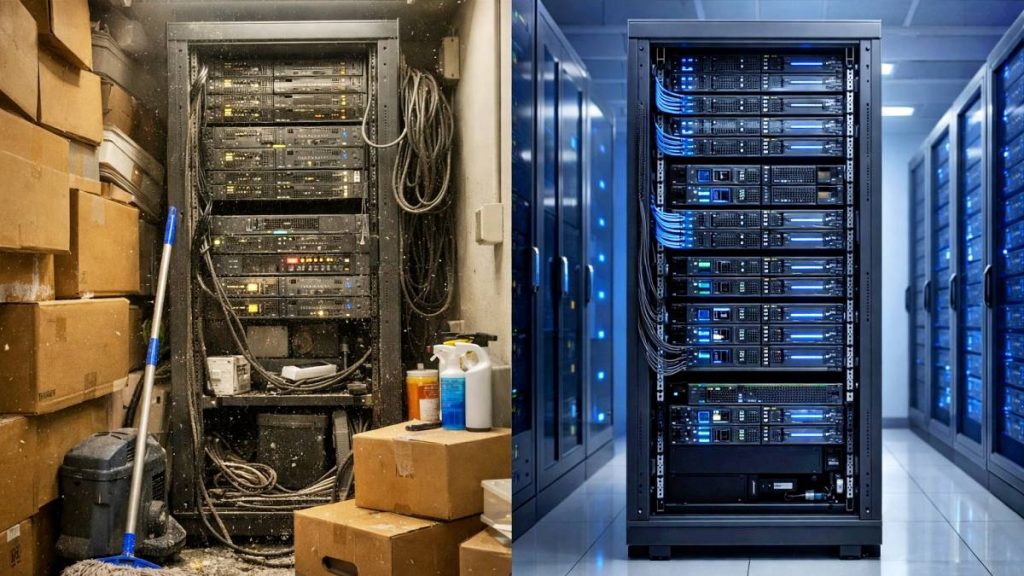In today’s technology world, the cloud dominates most IT conversations. From startups to enterprises, everyone is embracing cloud platforms. With promises of scalability, accessibility, and cost savings, it’s easy to see why. But amid this cloud frenzy, a critical infrastructure option often gets overlooked: local colocation.
At Datacate, we’ve observed that businesses that choose local colocation data centers gain unique advantages that even the most sophisticated cloud environments can’t match. Let’s explore why physical proximity to your infrastructure still matters in our increasingly virtual world.
The Proximity Advantage: More Than Just Geography
When we talk about “local” colocation, we’re referring to housing your servers and equipment in a professionally managed data center that’s geographically close to your business operations. This proximity creates several distinct benefits that impact everything from performance to peace of mind.
Latency You Can Feel
Cloud services are impressive, but physics still applies. Data traveling across thousands of miles experiences latency – that slight delay that can make applications feel sluggish. This delay can be negligible for many standard business applications, but even milliseconds matter for data-intensive operations, real-time processing, or customer-facing applications.
Local colocation dramatically reduces this latency by keeping your infrastructure physically closer to your users. The result? Snappier applications, smoother user experiences, and happier customers.
Hands-On When You Need It
One of the most underrated benefits of local colocation is the ability to physically access your equipment whenever necessary. While cloud environments offer remote management, there are situations when hands-on access is invaluable:
- Interaction and data transfer via direct connections
- Rapid hardware upgrades or replacements
- Physical security audits
- Component-level modifications
Local colocation data centers like Datacate provide secure, 24/7 access to your equipment. You’re never more than a short drive away from your infrastructure, giving you a level of control that’s impossible with distant cloud deployments.
Real-World Control in a Virtual World
There’s something reassuring about seeing and touching the systems that power your business. Local colocation offers the perfect balance – professional management of the facility while maintaining your control over the actual hardware.
This physical connection creates a compelling benefit: confidence. Decision-makers sleep better knowing where their data lives and who has access to it.
The Financial Picture: Beyond Simple Comparisons
Cost comparisons between colocation and cloud solutions often focus on simplified metrics that don’t tell the whole story. While cloud platforms can offer attractive pay-as-you-go pricing, local colocation provides financial benefits that don’t always appear in basic calculators:
Predictable Budgeting
Cloud costs can fluctuate dramatically based on usage, data transfer, and additional services. These variable expenses can create budgeting headaches and occasional unpleasant surprises.
Local colocation typically operates on a fixed monthly fee structure, making IT expenses more predictable. This consistency is particularly valuable for growing businesses needing to accurately forecast expenses.
Hidden Cost Avoidance
Cloud platforms charge for data egress (moving data out of their networks), API calls, and other activities. These costs can accumulate quickly, especially for data-intensive operations.
With local colocation, you avoid these nickel-and-dime charges. Once your equipment is in place, your costs remain largely stable outside of service upgrades.
Long-Term Investment Protection
For businesses with significant investments in hardware, colocation allows you to continue leveraging those assets rather than abandoning them for cloud alternatives. This extends the useful life of your equipment and improves your overall return on investment.
The Human Element: Relationships Matter
Perhaps the most overlooked advantage of local colocation is the human connection. Working with a local data center provider means building face-to-face relationships with the people responsible for your infrastructure’s security and reliability.
Personalized Support
When issues arise, you’re not just another ticket in a global support queue. Local colocation providers know your business, understand your specific setup, and can provide personalized support that remote cloud providers simply cannot match.
At Datacate, our technicians build relationships with our clients’ IT teams. This familiarity creates a partnership approach to problem-solving that’s invaluable during critical situations.
Customized Solutions
Every business has unique requirements. Local colocation providers can offer tailored solutions that accommodate your needs – from custom rack configurations to specialized cooling arrangements for high-density deployments.
These customizations aren’t just convenient; they can significantly impact performance, reliability, and cost-effectiveness.
Business Continuity: Local Advantages
Disaster recovery and business continuity planning benefit tremendously from local colocation facilities. While cloud providers offer excellent redundancy options, local colocation provides distinct advantages:
Physical Disaster Separation
Having your primary systems and backup infrastructure in physically separate locations protects against localized disasters while maintaining the performance benefits of proximity.
Rapid Recovery Options
Local colocation allows for faster physical restoration of services when recovery is necessary. Your team can be on-site immediately, working directly with facility staff to restore operations.
Hybrid Resilience
Many businesses are finding that a hybrid approach – combining local colocation with selective cloud services – provides the optimal balance of resilience, performance, and cost-effectiveness.
This approach allows you to maintain critical systems locally while leveraging cloud platforms for specific workloads or backup purposes.
Security Considerations: The Visibility Factor
Security concerns drive many infrastructure decisions. Local colocation offers unique security advantages that cloud environments struggle to match:
Physical Security Transparency
You can personally inspect security measures with local colocation, from access controls to surveillance systems. This transparency provides assurance that’s difficult to achieve with distant cloud facilities.
Compliance Confidence
For businesses in regulated industries, demonstrating compliance often requires detailed knowledge of where data resides and how it’s protected. Local colocation makes these audits and verifications more straightforward.
Sovereignty Certainty
Data sovereignty – ensuring your data remains within specific jurisdictional boundaries – is increasingly important for regulatory compliance. Local colocation gives you absolute certainty about where your data lives.
Scalability: Colocation Grows Too
One common misconception is that cloud platforms offer superior scalability compared to colocation. While cloud services excel at rapid elasticity, modern colocation facilities offer impressive scalability options:
Planned Growth
For businesses with predictable growth trajectories, colocation allows for planned expansion without the premium costs associated with cloud scalability.
Hybrid Flexibility
Many businesses implement hybrid architectures that maintain core systems in colocation while using cloud resources for variable workloads or seasonal demands.
Right-Sized Resources
Colocation allows you to scale precisely the resources you need – compute, storage, or networking – rather than being constrained by predefined cloud instance types.
Environmental Considerations: Local Impact
Sustainability concerns are increasingly important in infrastructure decisions. Local colocation offers environmental benefits worth considering:
Energy Efficiency
Modern colocation facilities implement advanced cooling technologies and power management systems that are often more efficient than on-premises server rooms and massive cloud data centers.
Infrastructure Lifespan
Colocation reduces the environmental impact of frequent equipment manufacturing and disposal by extending the useful life of hardware through professional management.
Community Investment
Choosing a local data center provider supports local jobs and economic development, positively impacting your business community.
Conclusion: The Case for Local Colocation
While cloud platforms will continue to play an essential role in the IT landscape, local colocation offers distinct advantages that shouldn’t be overlooked in your infrastructure strategy:
- Physical access and control of your equipment
- Reduced latency and improved performance
- Predictable costs without surprise fees
- Personal relationships with your infrastructure team
- Customized solutions for your specific requirements
- Enhanced disaster recovery capabilities
- Transparent security and compliance
As you evaluate your infrastructure options, consider how local colocation might complement your cloud strategy. The ideal solution for many businesses isn’t choosing between colocation and cloud – it’s leveraging both in a thoughtful hybrid approach that maximizes the benefits of each.
The Datacate Difference: Local Colocation Excellence
At Datacate, we’ve built our colocation services around the specific needs of businesses that value both cutting-edge technology and local presence. Our Sacramento-area data center combines enterprise-grade infrastructure with the personalized service that only a local provider can deliver.
We understand that infrastructure decisions aren’t just technical considerations but strategic business choices that impact operations, finances, and customer experiences. Our team works closely with clients to design colocation solutions that address their specific requirements while providing the reliability and security that modern businesses demand.








